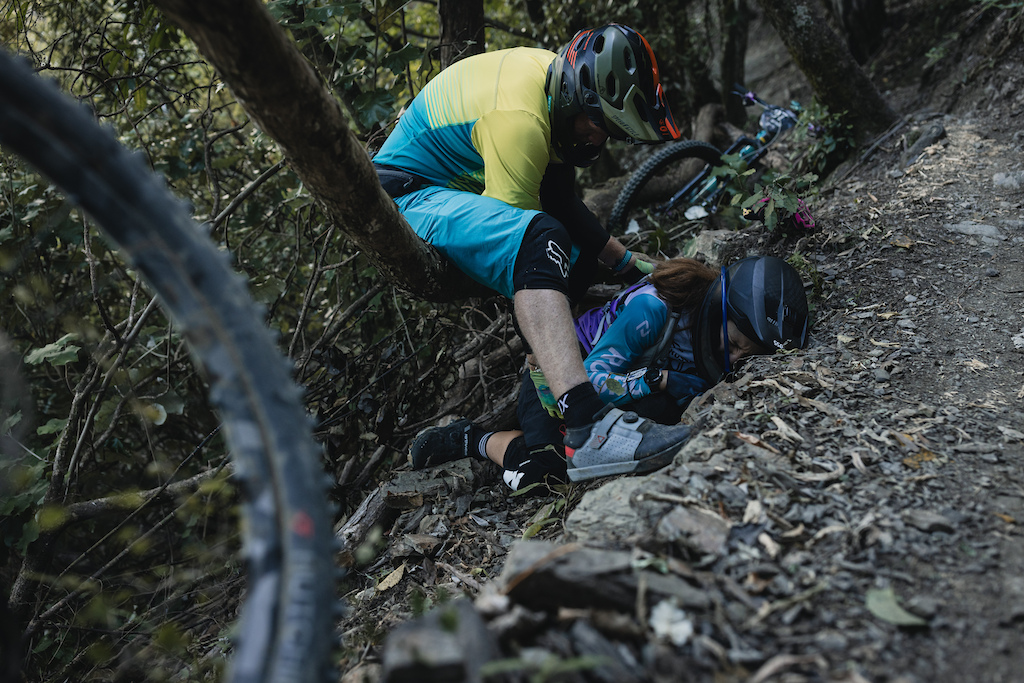Update March 25, 2024  | I have several fractures at the head of the humerus but they aren't displaced, and my shoulder has been dislocated.
I'm back in France, I saw a surgeon this weekend, there is no operation planned. We are waiting for a final exam next week to be 100% sure.
I will try to transfer my registration from the Trans Madeira to the second edition in September and I should be back on the bike for Stoneking.
The ups and downs of our sport are sometimes difficult... but I am determined to recover quickly.—Morgane Jonnier |
French athlete Morgane Jonnier went down hard near the end of Stage 1 on the final day of the NZ MTB Rally last week. Morgane was sitting in second place behind Rae Morrison at the time after having already completed over 2.5 hours of racing.
Here is what she had to say on social media (translated from French).
 | Small update... the week didn't end in the best way possible. A crash & a helicopter evacuation concluded my @nzmtbrally. Heading back home Thursday for France to continue exams.
Thank you for all the messages of kindness, & help I’ve received following my hospitalization. Sad to end the Rally this way, but shared 5 great days on the bike with the chance to ride in completely new spots & meet some great people, the bike is a vector of many beautiful things even if there is a setback sometimes you just accept it & go back.—Morgane Jonnier |
 | French athlete Morgane Jonnier went down hard near the end of Stage 1, with a nasty shoulder injury and quite obviously in a lot of pain. Access on this part of the trail was far from an easy task, and whilst our crew were on scene immediately and a helicopter was overhead not long after, Morgane suffered bravely for well over an hour before an heli-extraction by winched-stretcher could be safely completed. It was a sober reminder that whilst this race is about good times and adventure, the inherent risks of our sport can never be completely eliminated.—Ali Jamieson, NZ MTB Rally |
We're bummed for Morgane who had an epic season of
multi-day enduro races for 2024 and hope she makes a swift and full recovery.



Good ol' google translate. Crash/ride. Same thing.
Hoping for a quick recovery
I'm curious though, as an amateur (and American), about the financial cost of a crash like this. Couldn't find much on a quick search. Any Europeans care to chime in? Do sponsors or event insurance cover the cost of rescue? What would a typical EU citizen in a similar situation be expected to pay?
For context, I had a Class V clavicle separation two seasons ago that cost about $5000 to fix (and I have really good insurance.)
I guess athletes have special insurances that cover those expenses in foreign countries.
Did you pay 5000$ or was that the total cost ?
Furthermore, if you need to take time off work and lose income, you are fairly compensated for that too. Remarkably, this even includes tourists and visitors as well as NZ residents. At a high level, this is one of the reasons why there are very few ambulance chasers and pretty much no compensation culture at all - because there's no 'net financial loss' to an individual and therefore technically nothing to legally be compensated for.
It is such an amazing scheme which is paid for by a very modest national levy on all employers, from large companies to the self-employed.
Regarding the heli-lift itself, this is provided by the local heli rescue organisation which is technically a public charity, and accepts donations from the general public as well as from the government.
As organisers of the event, we will make a voluntary donation to the heli rescue service (regardless of if we use them or not - this is definitely not a pay-per-use kind of service!). Professional Doctors and paramedics on the scene first, were all there working the event as volunteers, just for the record.
As far as we are aware, the only cost to the individual in a case such as Morgane's, would be the medical repatriation costs (in this case, back to France) but of course we are not party to Morgane's individual personal arrangements. What we do know is that she had plenty of offers to be taken care of here in Nelson from the local community when she came out of hospital, whilst she arranged for her trip home. But that's just standard Kiwi hospitality as far as I'm concerned.
More details about all of this are on the event website here (click the Accident Insurance tab):
nzmtbrally.com/travel
Helicopter rescue in Slovenia is also free. For now, there are people that want to make it paid. For now the country covers the helicopter operating costs (helicopters and pilots are provided by the army or police) and the techs and doctors (all part of the mountain rescue service) do it on a volunteer basis.
I remember the helicopter crew coming to visit me in hospital, one of them said "I hope you've got a good job, the helicopter costs £4000 per hour to operate". They enjoyed my panicked look for a few seconds before laughing and telling me I wouldn't have to pay anything.
Obviously we pay national insurance towards our health and social security, but outside of that there was no financial cost to me.
Three and a half years later, the shoulder still bothers me... eventually I would like to get it fixed, but I'm pretty sure it'll be entirely self-paid.